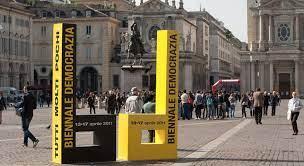
http://biennaledemocrazia.it/biennale-democrazia-2022-project/
The pandemic is still lingering and these harsh years have put to the test governments’ ability to address emergencies, society’s capacity to withstand the burden of the unforeseen: all this has had a major impact on the relationship between citizens and institutions. This is why it appears central to rethink the fundamental issues of our democratic systems. And this is why Biennale 2023 is starting again from the idea of freedom. Equality and freedom are some of the tenets of democracy: civil liberties, the consolidation of political rights and the progressive extension of social rights are parallel interfacing processes. Over the past two centuries that the political systems we usually term democratic have laboriously become more consolidated, a host of meanings have found place under the umbrella term of freedom, some of which even conflicting. Opposing the whims of a tyrant, freeing oneself from social and political servitude, religious tolerance, freedom of expression, freedom of conscience through thoughts, words, the press and other media. Freedom was interpreted as emancipation from tradition, or in a more specifically political sense as the freedom of association and above all free elections. It is the freedom of the market to produce, trade and consume, but also to pursue customs and uphold body rights, just as the choices and privacy of the personal sphere. And lastly, the freedom of the weak and of powerful are not the same thing, the latter always at risk of becoming unbridled arrogance. As Montesquieu wrote «There is no word that admits of more various significations, and has made more varied impressions on the human mind, than that of liberty.» Freedom is the most disputed notion at the table of politics, a bone of contention between political factions and cultural traditions, so much so it has become a variously described flag of several actors and movements. Hence the need to start speaking about freedom with the aim of understanding its facets and nuances, to delve into its contradictions, debating its limitations and possible progresses.
As we were having an ongoing discussion about freedom, the Ukraine conflict broke out in February 2022, bearing the spectre of war into Europe, an ever present ever suppressed ghost. Some had seen freedom and democracy as an unavoidably path for humanity while the two ideals suddenly materialized as one side’s values, often leading to simplifications and echoing the warning of so many European thinkers and EU founders who believe there was no freedom without peace. Our title At the Edge of Liberty will start again from the relationship between freedom and democracy, within and outside our society.
THE 8TH EDITION IS ORGANIZED AROUND FOUR THEMES
Unlimited Freedom
Democratic societies are criss-crossed by tensions arising from demands for ever more civil, social, political and economic freedom. The pandemic has enriched and confused the debate, polarizing it between those who feared the onset of a health dictatorship, and those who considered the protests against the restrictions and the vaccinations as a dangerous irresponsible and antisocial reversal of the demands for freedom. This calls for us to rethink the many meanings of freedom – its possible limitations, first and foremost those caused by the climate crisis – and how it relates to the technical-scientific knowledge and with technology. In particular we need to focus on the relationship between equality and freedom ever since the French revolution, values that are both twin but under tension.
Clash of Freedoms
Illiberal democracies, aka democratures, hybrid regimes, low intensity democracies: these are more new definitions are an attempt to a name to nationalist and illiberal transformations in those countries in and out of Europe. These are countries where basic rights and guarantees which we took as a given such as freedom of expression and press, the independence of the Courts, and the respect for minorities are questioned. A comparison among these situations with expand our horizons on freedom and democracy in a wider geopolitical perspective, with reference to increasingly harsher conflicts and the resurfacing of the nuclear threat.
Freedom as a Format
The war and the pandemic highlighted the state of slow deterioration in our country’s public debate, well pictured by the tired talk show format often reduced to a clash between acritical and irreconcilable positions, reducing freedom of expression to a principle whereby every position needs its opposite. If democracy is to work, it develops against a backdrop of the need for information pluralism as well as the dialectics between old and new media, on the possible limits to the freedom of expression, the role of education and culture as a precondition for a person’s autonomy, the spectre of the so called cancel culture and the relationship between intellectuals and experts.
Imagine there’s Freedom
In our modern world, freedom underlies the idea of how we imagine the future. Be they artistic utopias or political revolutions, they all started with the idea of freeing all human beings from their chains. Likewise, dystopias have raised a warning against the risks of mild or strong political, technological or economic despotism. How do literature, art, music, cinema and television represent freedom? What are the metaphors or characters of emancipation and slavery? And lastly, how do we imagine the future of our societies and new generation betwixt freedom and servitude?










Add new comment